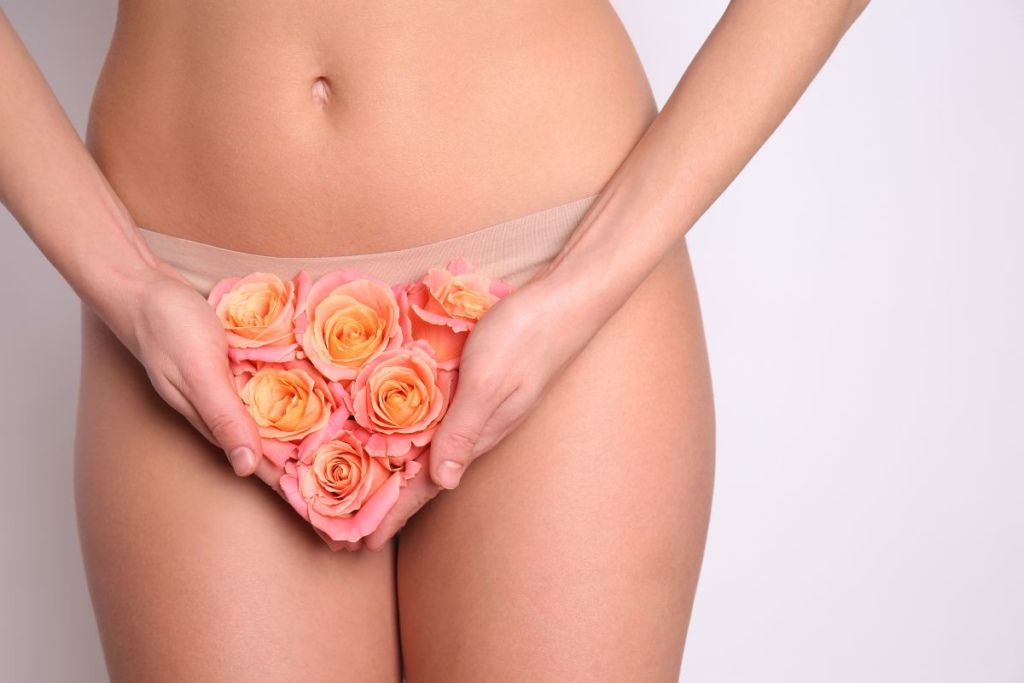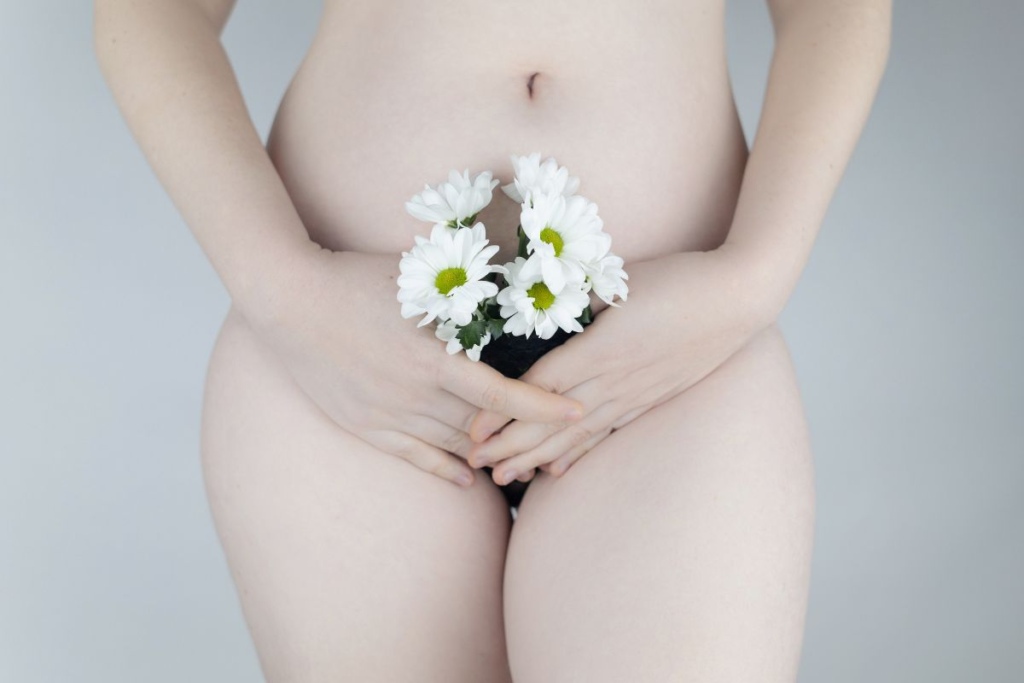The vagina is a pretty remarkable thing. Among its many talents is the ability to self-clean. Leave the vagina to its own devices and it will generally flush out the bad to keep itself in good condition.
The vulva might not clean itself, but warm water is all you need to stay fresh.

Intimate washes claim differently. Intimate washes are often marketed as a way to ensure your vagina is fresh and clean.
But in reality, intimate washes can work against the natural cleaning process, leading to irritation, discomfort, and potentially even infection.
In this guide, we’ll take a closer look at what intimate washes are and why you don’t need them. We’ll also investigate the best way to keep your vagina and vulva clean. Spoiler: you don’t need to do very much!
All About Intimate Washes
An intimate wash, sometimes known as a feminine wash or a vaginal wash, is a product designed to clean the vulva.
Before we dive deeper into what an intimate wash is, let’s take a look at what it’s actually meant to clean. Intimate washes are primarily designed for the vulva.
This is the external genital area, and it includes the labia minora and majora, the clitoris, and the urethral and vaginal opening. Intimate washes generally don’t clean the vagina, because the vagina is inside the body!
However, some intimate washes, such as douches, are designed to clean inside the vagina. These are widely regarded as unsafe and have been linked to both premature births and contracting HPV.
Vaginal douching has lost popularity in recent decades, so these forms of intimate washes are increasingly rare.
Intimate washes for vulvas are sold as a healthier alternative to body wash, which isn’t designed for such a delicate area and can lead to irritation.
They’re marketed as feminine hygiene products, so you’ll typically find them with tampons and pads, rather than shower products.
So, what’s the point of the intimate wash? Essentially, intimate washes are meant to make your vulva smell better and feel better, keeping it squeaky clean for you and your sexual partners.
Unfortunately, to do this, intimate washes strip away the natural protection of your vagina. This leaves you vulnerable to infection, as well as dry and itchy.
If you’ve been experiencing vaginal discharge, you might consider using an intimate wash to “clear” away the problem.
But vaginal discharge isn’t something you need to combat. Instead, it’s a natural process your body goes through to keep your vagina clean and healthy.
What Is Vaginal Discharge?
If you have a vagina, then you have some level of vaginal discharge. It’s produced by the uterus, cervix, and vagina, and controlled by your sex hormones.
Vaginal discharge consists of cells and bacteria that help to keep the vagina healthy by fighting off infection.
It’s pretty hard to nail down just what “healthy” vaginal discharge is like. Vaginal discharge should be white or clear, with a mild scent that shouldn’t smell bad.
Vaginal discharge can be thick or watery, sticky or gooey. The amount of vaginal discharge you produce can change throughout your menstrual cycle. Some people produce a lot of discharge naturally and other people don’t!
Small changes to the amount, texture, or color of vaginal discharge throughout a cycle are rarely a cause for concern. Pregnancy and birth control can also affect vaginal dryness.
If you notice a change in color, texture, or consistency to your discharge, or it develops a bad odor, this could be an infection. In this case, you need to speak to a doctor, so you can get the problem cleared up. An intimate wash won’t help, because it won’t tackle the source of the complaint.
Intimate wash might help clear away your vaginal discharge — but it shouldn’t. Discharge plays an important role in keeping the vagina healthy, as it contains bacteria that protect the vagina from infection.
Do I Need To Wash My Vagina?
Each vagina has its own unique scent caused by pheromones. These pheromones determine what your vagina smells like, and it’s very unlikely to be a fresh field/clean laundry/a bouquet of flowers/whatever deodorant you buy.
The best smell for your vagina is its natural smell. This means it’s fresh and healthy, and it isn’t subject to harsh chemicals that might be stripping away bacteria.
If there’s a noticeably bad or “fishy” smell to your vagina, then it might be a sign that you have an infection. It isn’t a sign that you need to start using intimate washes.
These might help briefly mask the scent, but they won’t do anything to fix the problem. Instead, you want to speak to a healthcare professional, who can help you find the right method to clear up the issue.
It’s normal for the vagina to have a light scent. It won’t smell like a basket of freshly cut roses because it’s a body part and they just don’t work that way!
However, the natural smell of your vagina is a good thing. It means your vagina is happy and healthy. If a partner complains about the smell of your vagina (and they aren’t concerned about an infection), then they probably don’t deserve to be around it!
With that said, it is good to gently clean the vulva. Use warm water to gently clear away the sweat and dirt that has a habit of building up throughout the day.
You should also clean the area between the vulva and the anus, to prevent any unwelcome bacteria from spreading.
Why You Shouldn’t Use Feminine Wash

On the surface, washing away bacteria might not necessarily sound like a bad thing. We tend to associate bacteria with dirt and muck, which isn’t something you want in your vagina.
But living inside our bodies are a host of good bacteria. We’re most familiar with the good bacteria in our gut, which we nourish with healthy eating, lots of liquids, and the occasional probiotic yogurt.
There are also good bacteria in the vagina. This good bacteria, known as lactobacilli, helps to fight off infection.
When you use an intimate wash or feminine wash that cleans inside the vagina, or you douche, you can start flushing away that good bacteria. The natural balance of the vagina falls off, allowing certain infections to thrive.
So, the best thing you can do is let the vagina get on with its own cleaning!
Safely Cleaning Your Vulva
The vulva and the vagina are two different parts of the body, although they are often confused and misnamed. The vagina is the part that is inside the body. It doesn’t need to be cleaned because it cleans itself.
The vulva is the stuff that’s outside the body. This includes the vagina opening, the labia majora and minora, and the clitoris.
Because the vulva is outside the body, it does need regular cleaning. Like any other exterior body part, the vulva can get a little dirty in day-to-day life.
Let’s take a look at what you need to safely clean your vulva:
Warm Water
And that’s it! You shouldn’t use any “feminine washes” or body washes. This is a sensitive area of the body, and soaps and washes can cause irritation. All you need is clean, warm water.
To wash your vulva, work from front to back using warm water. Gently spread the vaginal lips and use warm water to clean around the folds. You can use a clean washcloth or your hands. Be gentle! You want to avoid getting water inside the vagina.
Once you’ve finished here, begin moving backward. You want to start with the vulva, then move back to the anus.
Don’t go the other way around, or you might spread bacteria from the anus to the vulva. This can cause some pretty nasty infections.
You don’t need to use soap to wash your vulva. If you do want to use soap for a “cleaner” feeling, pick a soap that’s free from fragrances and dyes, and uses only mild ingredients.
Fragrance and dye can both lead to uncomfortable irritation.
Your vulva needs to be washed along with the rest of your body — roughly once a day. If you’re on your period, you might want to clean it a little more often, but avoid washing it more than twice a day. You might start to irritate the skin.
Once you’ve finished, gently pat yourself dry with a clean towel. Make sure you’re fully dry before getting dressed. It’s not good to sit in damp underwear!
Using “Natural” Washes
Intimate washes, sprays, and wipes were generally created to prey on insecurities. When people are told that a product can help eliminate the “smell” of their vagina, they start to worry that their vagina has a smell.
Similarly, when you see vagina wash for sale, you suddenly start to worry that you aren’t washing your vagina right!
However, in recent years, more information has become available about the danger of these practices.
People are wising up to the fact that their vagina doesn’t need a pile of chemicals to be healthy, and that these chemicals might actually be the problem!
In response, there’s been a rise in “natural” feminine washes. These are made from supposedly gentle ingredients, often organic, designed to match the pH of your vagina.
It might sound good, but the reality is, you still don’t need them! Most of these washes still contain fragrance, and even “natural” fragrances can irritate the vagina and cause it to dry out.
Take a brief scroll through the internet and you’ll also find a lot of “DIY” intimate wash recipes. Most of these recipes claim to use natural ingredients, often including essential oils as fragrances.
Essential oils can be dangerous for the skin, even when they’re heavily diluted. Avoid putting them anywhere near your vagina.
Many DIY recipes also recommend using castile soap to clean your vulva. Don’t do this! Castile soap is very strong and needs to be highly diluted before you use it anywhere on your body.
It’s far too powerful for the delicate vulva. You can use castile soap to clean your kitchen, so it is not safe around the genitals.
The reality is that as intriguing as these natural washes might sound, none of them are better for your vagina or vulva than warm water.
An Overview Of Using Intimate Washes
- Vaginas naturally have their own scent. This is a result of pheromones. Every vagina smells different and no vagina smells “wrong”. You should only worry about your vagina smell if it changes to a noticeably bad odor.
- The vagina has self-cleaning properties. Excessive washing can actually harm the vagina, as it can shift the balance of bacteria out of sync. The discharge your body produces is part of this cleaning process, containing good bacteria that fight infection.
- Intimate washes claim to do a job that your body is already doing naturally. Using intimate washes can prevent the vagina from engaging in its natural cleaning routine.
- The vagina and the vulva are two different things. The vagina is inside the body, the vulva is on the outside. You shouldn’t clean your vagina, but you should gently wash your vulva.
- When washing your vulva, all you need is warm water. Wash gently from front to back, pat dry, and go about your day!
Conclusion
Intimate washes are essentially an expensive and ineffective way to do something your body already does. The vagina is self-cleaning, and this self-cleaning process helps it protect against infection and stay healthy.
You should wash your vulva (the external parts of your genitals), but the only thing you need is warm water. Scented soaps and washes can cause irritation, stripping away your natural defenses.
And you don’t need to perfume your vagina. Your vagina smells fine! If there is a smell from an infection, consult with a doctor for real help.
Frequently Asked Questions
What Are The Side Effects Of Using Feminine Washes?
Feminine washes and douches both strip away the natural defenses of the vagina. This leaves the vagina vulnerable to infection, and it can also cause irritation and discomfort.
Are Natural Intimate Washes Safe To Use?
“Natural” intimate washes might claim to use ingredients that are better for the body, but they often contain irritants such as fragrances and dyes. The only wash you need is the most natural one there is — water.



